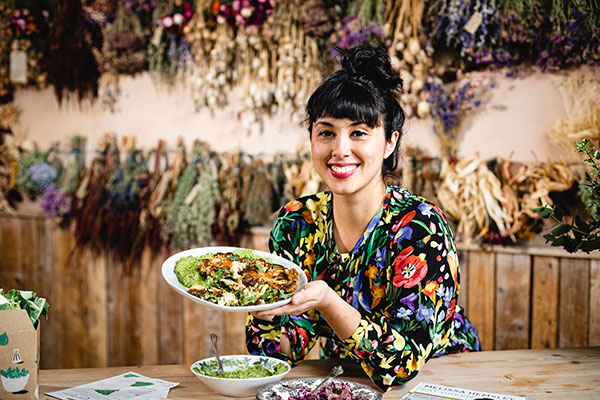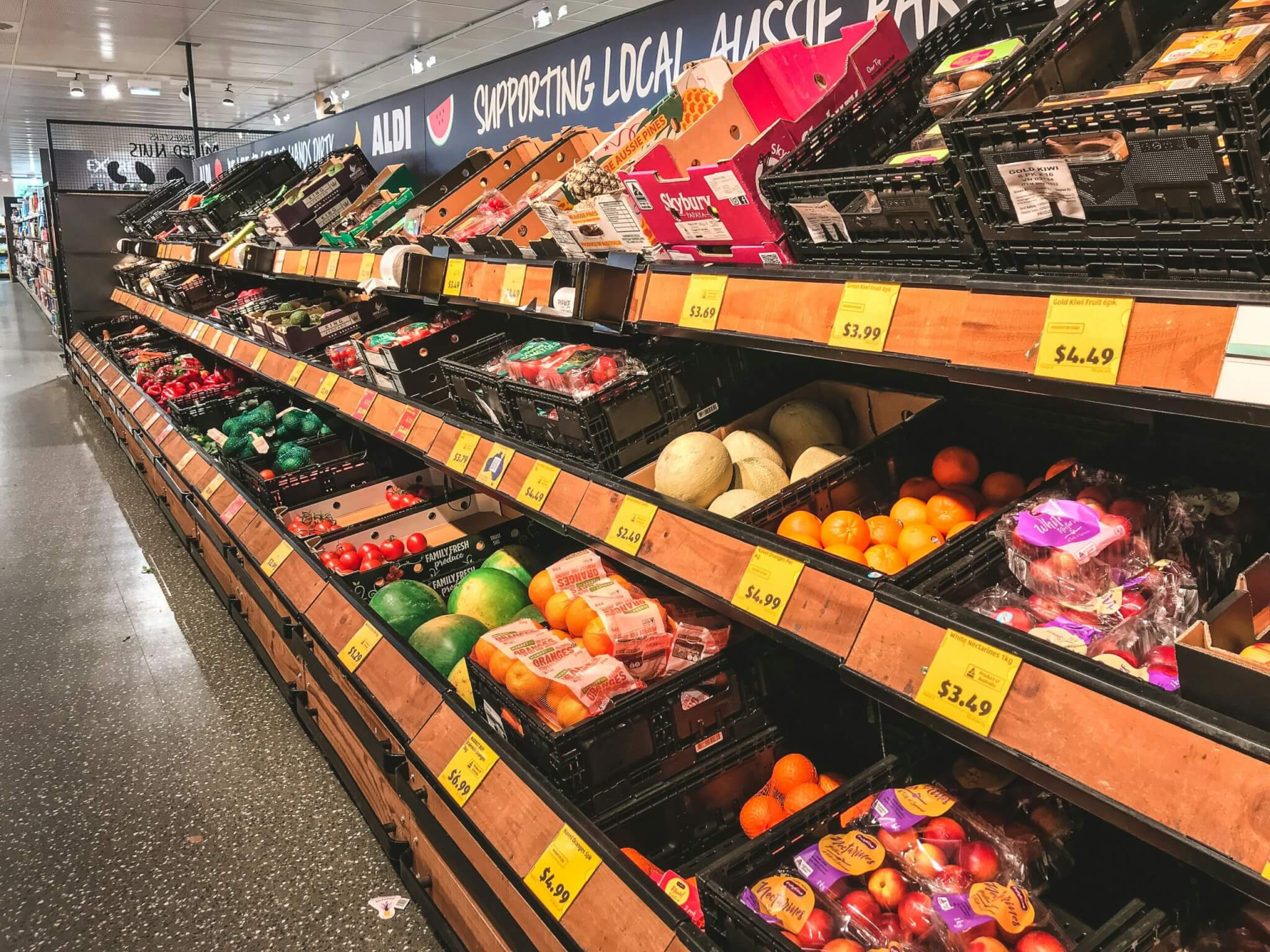After two weeks of train food on tour to promote her latest book, Melissa Hemsley is understandably in raptures at the sight of fresh vegetables.
“I’m so pleased because I saw ‘light lunch’ on the itinerary and I had breakfast at 6.30 – I’m like I don’t want a light lunch,” she says, tucking into colourful platters of heaped vegetables at Riverford’s Field Kitchen restaurant.
Eat Green is Hemsley’s fourth book, and her second solo venture (she became known as one half of sister cooking duo Hemsley and Hemsley), combining seasonal, mainly plant-based recipes, alongside tips to use up leftovers and cut out plastic, like using a plate instead of cling film to seal leftovers in the fridge.
More food arrives, this time venison, swede and lentil bake, and the topic turns to meat. It’s one of the more contentious topics in the food sphere at the moment, but Hemsley is ambivalent. “I don’t really know how much I eat meat,” she muses.
“I would say my main form of animal products comes from eggs, butter, cheese, and then I have a lot of broth. We grew up with most of our meals being broth-based, loads of chicken broth, beef broth, fish broth.”
What bothers her more is the issue of food waste, which she sees as an issue that “can unite us all”.
“I remember a couple of years ago, people would be like ‘oh she’s so funny taking a doggy bag to a restaurant’,” she says. “Even if I was going out after, you’re in London – there’s always going to be someone to give it to within two seconds.”

Hemsley credits her parents with inspiring her attention to waste, including her mother, who, she jokes, should really be receiving a cut of the book’s profits as she gave so many of her tips without realising.
“My mum didn’t ever sit with me and cook, but I knew from watching her that you didn’t throw away cauliflower leaves or broccoli stems,” she says. “But also I think I absorbed it from my dad and the army side, where everything has its place: they wouldn’t even call it saving waste, they’d just say you can eat that, so eat it.”
She is critical of the food media industry for partly encouraging food waste, noting that: “They might not do it in their own kitchen, because they’re throwing away money and chefs know that, but on TV, chefs will only chop to that part and then sweep the rest into the bin.”
An advocate for organic food, Hemsley is aware about the accessibility issues, and says: “obviously having better quality meat is going to cost more”. “But I’m going to help you with that, because I’m going to help you eat a little bit less if you want to, or if you don’t want to, I’m going to show you how you’re going to stretch your meat further,” she says.
“I’m talking about chicken thighs, which you might turn into three meals. Or for example, we had a Riverford cooked ham delivered on Christmas Eve, and the day we said goodbye to the last piece, we reckon that fed around 30 people’s worth.”
The same goes for her book, which at £22, she calls a “luxury item”. “That’s one small part of what I do. That’s why I give so many recipes away online,” she explains.
The cover of Eat Green explains it has ‘planet-friendly flexitarian recipes’, but in fact, Hemsley says she isn’t a fan of labels. “I don’t encourage labels and I’m not saying this is a flexitarian cookbook and I follow a flexitarian diet, but people like to have a word to sum it up,” she says.
“But I’m trying to stay away from words like veganism, because I think by putting names on them, which are really helpful when you’re writing, or if you’re going to a restaurant, elsewhere they can be really off-putting or overwhelming.

As awareness of sustainability issues grows, like carbon emissions of food, it becomes increasingly difficult to navigate how to reduce your impact, and Hemsley is refreshingly open about how conflicting it can be.
“I’m a bit like you, I’m confused, I’m trying to make sure I spend enough time every single week understanding what new information and evidence is coming to light,” she says. “What I do try and do, is consider everything. I’m considering flying, I’m considering the way I live my life.”
Book writing is a small part of Hemsley’s day – she calls herself a ‘small-time author’ – the 34-year-old also writes a sustainability column for Vogue magazine, hosts a series of ‘sustainability sessions’, a series of talks she launched with women discussing various perspectives, and runs cooking demos.
“And then I’ve got the stuff I really like, which is the charity work and the work around mental health,” she says. “I get my learning from that area and meet other people outside the food world, which keeps feeding what I know, and gets you outside the bubble.”
She recalls volunteering in the Extinction Rebellion kitchens recently, choosing a less public-focused location to help make the large vats of food to feed thousands of activists, and is pictured on her Instagram wearing the group’s badge.

As she waited years for publishers to accept her book idea around food sustainability, I wonder if Hemsley thinks this interest in environmental issues will be just another commercialised ‘fad’, consigned to the shelf along with clean eating, or flexitarianism?
“I don’t think it can be compared at all. I think that people do massively care, and want to do better,” she says. “But sometimes they see people selling stuff so they associate it with ‘I’ve got to buy a more sustainable set of cutlery’. No, you can just carry a fork in your handbag. Literally chuck your fork in.
It’s a common sense approach combined with a friendliness that is hard to resist, neatly capturing the real power of Hemsley’s personality and her subsequent influence: eating good food, while doing the best you can environmentally, and enjoying it all as you go along.










0 Comments